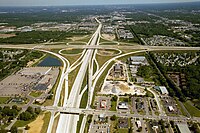
Photo from wikipedia
The exponential timestepping Euler algorithm with a boundary test is adapted to simulate an expected of a function of exit time, such as the expected payoff of barrier options under… Click to show full abstract
The exponential timestepping Euler algorithm with a boundary test is adapted to simulate an expected of a function of exit time, such as the expected payoff of barrier options under the constant elasticity of variance (CEV) model. However, this method suffers from a high Monte Carlo (MC) statistical error due to its exponentially large exit times with unbounded samples. To reduce this kind of error efficiently and to speed up the MC simulation, we combine such an algorithm with an effective variance reduction technique called the control variate method. We call the resulting algorithm the improved Exp algorithm for abbreviation. In regard to the examples we consider in this paper for the restricted CEV process, we found that the variance of the improved Exp algorithm is about six times smaller than that of the Jansons and Lythe original method for the down-and-out call barrier option. It is also about eight times smaller for the up-and-out put barrier option, indicating that the gain in efficiency is significant without significant increase in simulation time.
Journal Title: Arabian Journal of Mathematics
Year Published: 2020
Link to full text (if available)
Share on Social Media: Sign Up to like & get
recommendations!